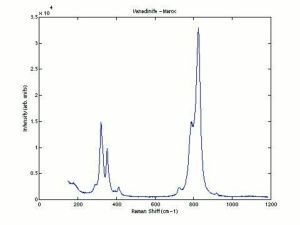Vanadium
Description
A ductile metallic element. Vanadium was discovered in 1803 by Andres del Rio, rediscovered in 1831 by Nils Selstrom, and isolated by Henry Roscoe in 1867. It has an abundance of 0.015% in the earth's crust and primarily occurs in the ores patronite, vanadinite, roscoelite, and carnotite. Vanadium is mined in Mexico, Peru, South Africa, Zambia, Italy, Germany, and the U.S. (Colorado, Utah, Arizona, New Mexico). The silvery white metal is primarily added to Steel to increase rust and wear resistance. Vanadium is also used as a target material for x-rays. Vanadium salts are used as yellow and red colorants in Glass and glazes, as UV absorbers, as mordants, and as photographic developers.
Synonyms and Related Terms
V; Vanadium (Deut., Fr., Ned., Nor.); vanadio (It., Esp.); Vanádio (Port.); Vanadin (Sven.); wanad (Pol.);
Physical and Chemical Properties
Soluble in hot mineral acids. Insoluble in water.
| Composition | V (atomic no. 23) |
|---|---|
| CAS | 7440-62-2 |
| Mohs Hardness | 7 |
| Melting Point | 1890-1917 C |
| Density | 6.11g/ml |
| Molecular Weight | atomic wt = 50.9414 |
| Boiling Point | 3000-3400 C |
Risks
- Contact and inhalation of dust may cause irritation.
- Fisher Scientific: MSDS
Resources and Citations
- Web Elements: Website
- G.S.Brady, Materials Handbook, McGraw-Hill Book Co., New York, 1971 Comment: p. 859
- Richard S. Lewis, Hawley's Condensed Chemical Dictionary, Van Nostrand Reinhold, New York, 10th ed., 1993
- The Merck Index, Martha Windholz (ed.), Merck Research Labs, Rahway NJ, 10th edition, 1983 Comment: entry 10053
- Encyclopedia Britannica, http://www.britannica.com Comment: "vanadium" [Accessed 20 Sept. 2005].
- Wikipedia: http://en.wikipedia.org/wiki/Vanadium (Accessed Sept. 20, 2005)
- Van Nostrand's Scientific Encyclopedia, Douglas M. Considine (ed.), Van Nostrand Reinhold, New York, 1976
- Random House, Webster's Encyclopedic Unabridged Dictionary of the English Language, Grammercy Book, New York, 1997
- The American Heritage Dictionary or Encarta, via Microsoft Bookshelf 98, Microsoft Corp., 1998
- Robert Fournier, Illustrated Dictionary of Practical Pottery, Chilton Book Company, Radnor, PA, 1992
